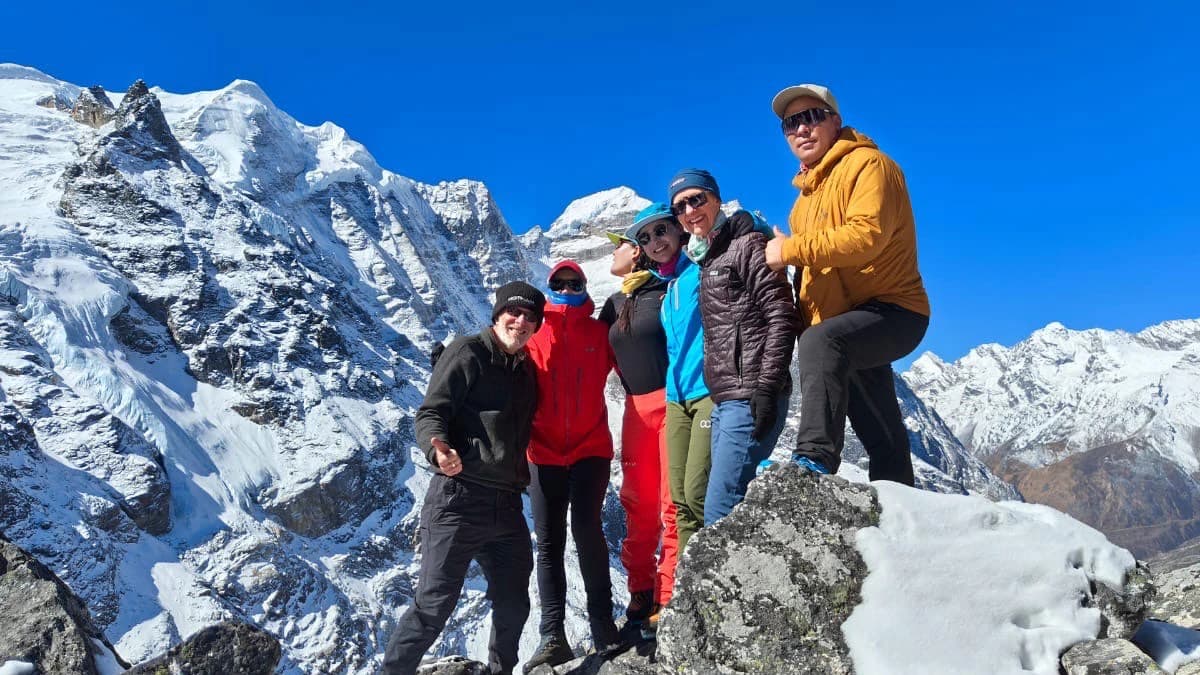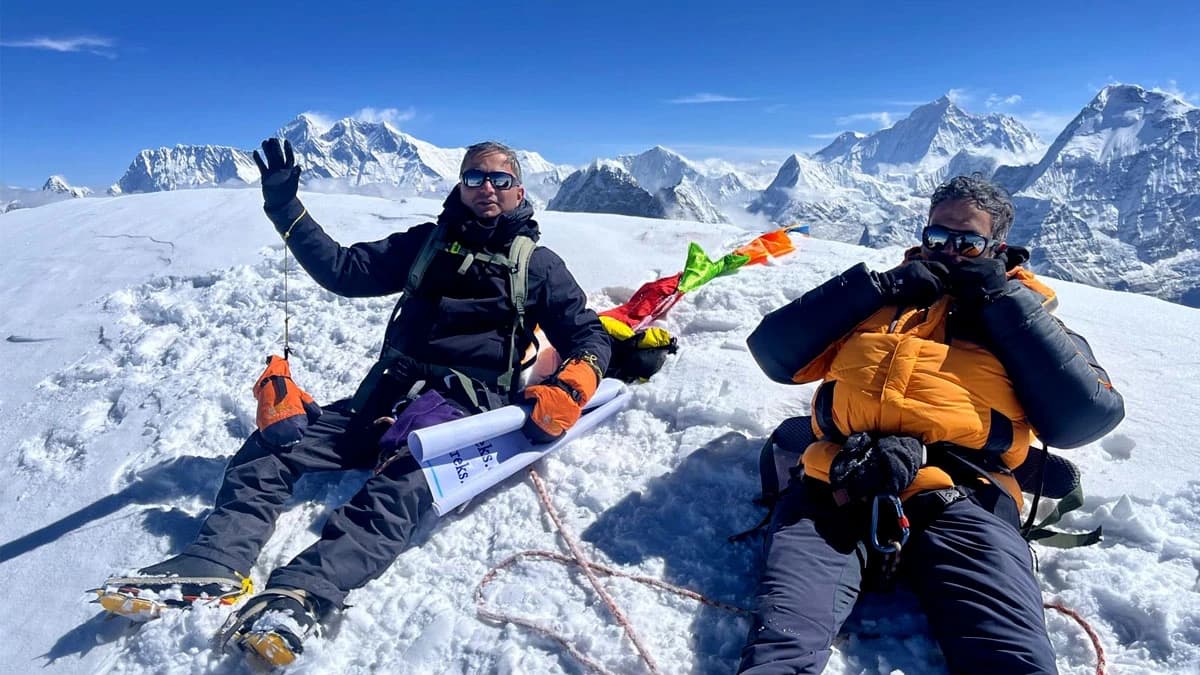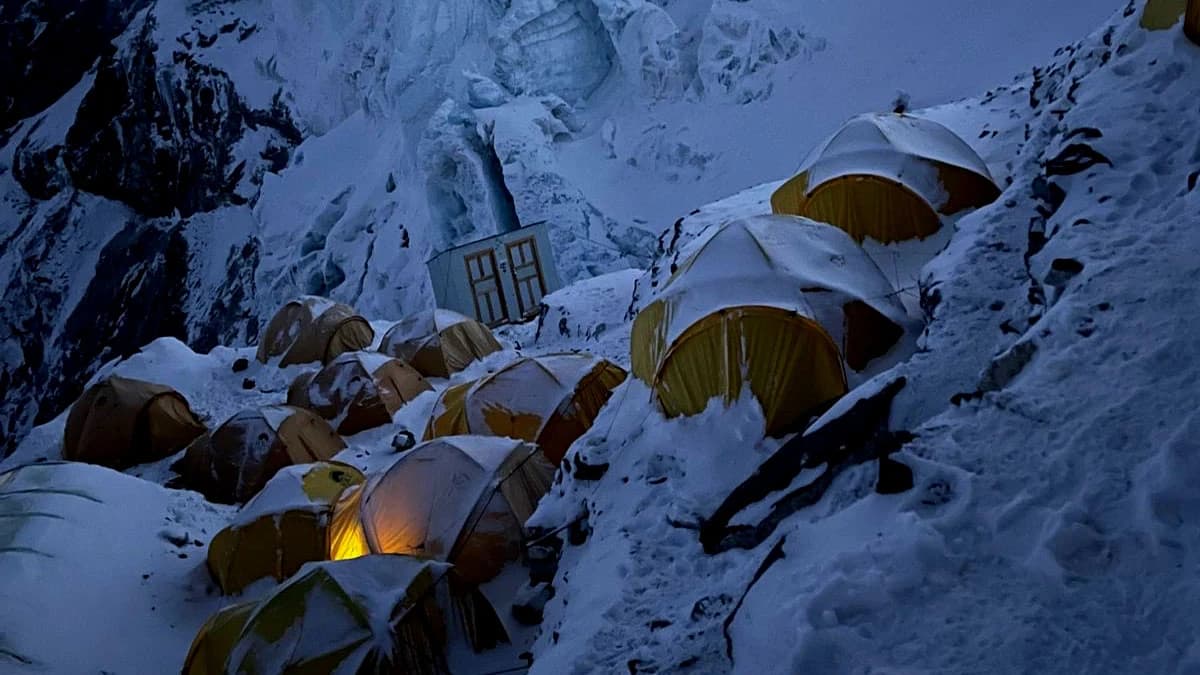Are you craving for something adrenaline-boasting adventure in Nepal this year, 2025 and 2026, looking forward to pushing your limits off and mark the new heights, well, if so, then we present this 22 days Mera and Island Peak Climbing via Amphu Lapcha Pass - 2 high peak expeditions that combines Mera and Island Peak climbing, in 1 single adventure and also attains to one of the daring high altitude passes - Amphu Lapcha Pass - 5845 meters, with other more than mountain passes over 3500 meters.
This journey is a dream-come-true adventure for wilderness seekers that gives you a sense of accomplishment with an exploration of the iconic Khumbu region, letting you unveil the beauty of the almighty peaks, Sherpa culture, ancient monasteries, rich Himalayan flora and fauna, where the almighty peaks befriend you in every step. This 22-day classic climbing adventure - Mera and Island Peak Climbing firstly, ascends to Nepal's highest trekking Mera Peak - 6476 meters, and then summits the thrilling ascent of the Khumbu region - Island Peak - 6189 meters via Amphu Laptsha Pass.
Mera and Island Peak Climbing via Amphu Lapcha Pass Route
If you are someone who craves adventure and wants to push their limits to the full extent, acing the rugged terrains, varied navigations crossing passes, glaciers, and reaching the summit point of the legendary peaks, then this Mera and Island Peak Climbing via Amphu Lapcha Pass is for you! This 22-day expedition combines the summit of two mountains - Island Peak (6189 m) and Mera Peak (6476 m), and also crosses one of the high mountain passes - Amphu Labtsa, and wanders the remote off-beaten route of the Everest region, giving an insight into wilderness adventure just like 90s climbers/hikers went through.
Our Amphu Lapcha Pass with Island and Mera Peak itinerary begins after 2 days of preparation in Kathmandu, with a Lukla flight from Kathmandu, and soon after, on this very day, hikes toward Paiya (2730), entering the Makalu Barun National Park, that is the eastern extension of Sagarmatha National Park (SNP)- one of the UNESCO world heritage sites. In between, we will also cross over the 1st pass, which stands out to be Chutok La Pass. Continuing the journey, the trek navigates following the roaring Dudh Koshi River, and crossing over another thrilling high mountain pass - Kari La Pass, with the blooming fine rhododendron, pine forest, that leads us to Panggom (2849 m), on the very next day.
The 1st vista of Mera Peak finally comes to our visualization when we begin our expedition, on the 3rd day within the Khumbu region, toward Ningsow (2849 m) - one of the hinkom valleys, via Panggom La Pass. Persisting in the journey ahead, on the following days, the trek will lead us to an uphill ascent to Ramailo Danda, and stop over Chhatra Khola, at 2800 meters, and Kothe (3692 m), traversing through several suspension bridges, cascading waterfalls, river streams, and ancient naturally formed caves in between.
The next day, the trailhead finally crosses the elevation of over 4000 meters, as we move to Thaknak, also called Tangnang, where the landscape starts to change to more rugged, glacier and rocky moraines, which takes us to Khare (5045 meters), walking past by two glaciers of Shar Glacier and Hinku Nup Glacier showing the prominent view of Mera Peak Northern Face, beautifully.
A pre-climbing training is set here at Khare, for 1 full day, on our acclimatization day, where we will get a pre-climbing session, and a memory recall on how to use gears, ice axes, harnesses, avoiding the cervaness, and so on. On this very day, it also plays a vital role in avoiding AMS (Acute Mountain Sickness), as this rest day allows us to adapt to the rising elevation before we climb Mera Peak. Proceeding with the further hike, we cross over Mera Glacier and Mera La Pass, which will eventually lead us to Mera Base Camp (5780 meters) and finally to Mera High Camp. As soon as we reach the high camp, the gigantic views of the iconic Himalayan range like Chamlang, Makalu, Baruntse, and the wide view of Mount Everest reward us with their enchanting view.
Finally, on the 12th day, we will take our summit toward the highest peak of Nepal - Mera Peak (6476 meters), with a round off ascent and descent of 9 hours, starting at early morning 2 AM, reaching the top summit of Mera Peak, it offers the breathtaking views of some of the legendary mountains such as Kanchenjunga - east, Lhotshe, Nuptshe, Ama Dablam, Langtang - west, stretching it's view to the world's highest mountain - Mt Everest - 8848.84 meters. Then, after the summit, we descend to Khongma Digma (4860 m).
Persisting the journey further, the trek takes us towards Seto Pokhari (5038 m), Amphu Lapcha Base Camp (5650 m), and finally Amphu Lapcha Pass, and Chhukung - 4750 meters, on the following 4 days, before we reach Island Peak base Camp on our 16th day. Summiting one of the technically strenuous climbing - Island Peak - 6189 meters, showing the impeccable view of Lhotse, Nuptse, Makalu, and others, the trek descends toward Pangboche, Namche Bazaar, and finally to Lukla, marking the end of our 22 days Mera Peak and Island Peak climbing via Amphu Lapcha Pass Trek after we take our flight back to Kathmandu - 1360 meters.
While this combined expedition of summiting Mera and Island Peak, both almighty mountains, might sound strenuous, wild, and adrenaline-boasting journey for you, your safety, comfort, and assistance of professional expert sherpa climbing guides, trekking guides, a strong sherpa with an experienced team, of turning your visualization to reality are all set to make your destination to himalaya - an insane journey filled with joy, motivation and marks the new height of lifetime.
Highlights
- Reach the summit of both legendary mountains - Mera Peak (6476 meters) and Island Peak (6189 m), in a single journey, and mark the new heights in style
- Wander around exploring the distinct Himalayan flora and fauna with the unique perspective of mountains within Sagarmatha National Park and Makalu Barun National Park
- Take a glance at the almighty Himalayan peaks within Khumbu valley, such as Lhotse, Nuptse, Ama Dablam, Makalu, Baruntse, and many others with each stride
- Cross more than 5 high mountain passes, including Chutok La Pass, Kari La Pass, Panggom La Pass, and several others
- Spend 1 day at the bustling town of Namche Bazaar, Lukla, and Pangboche - touching the standard route of Everest Base Camp (EBC)
- Get captivated by the view of the eighth thousanders amid the land of the Himalayas - Kanchenjunga, Makalu, Cho Oyu, Everest, Lhotse, Nuptse
- Explore the Sherpa culture, local lifestyle, traditions, and ancient livelihood while settling in the Hinku valley and the Everest region
- Reach one of the daring mountain passes - Amphu Lapcha Pass (5845 meters), crossing several glaciers and 5 holy lakes
- Experience the acing the heights over 6000 meters, after summiting Mera and Island Peak with best sherpa guides
How difficult is Mera Peak and Island Peak climbing via the Amphu Lapcha Pass?
The combined expedition summit of Mera Peak and Island Peak Climbing is considered a strenuous, challenging adventure that requires technical mountaineering skills, with perfect acclimatization days, and of course! A strong physical level of fitness is required. This peak climbing expedition is a 3 in 1 combined that covers three major destinations, which is difficult even if it's done solely, now combining all in one, demands a prior experience, long hours of distance coverage, and 2 summits to great heights over 6000 meters, hence, before you opt for this himalayan adventure, make sure you got a technical mountaineering skills.
The total distance coverage of Mera and Island Peak with the Amphu Lapcha Trek is more than 100 kilometers, almost 64 miles, with daily walking hours of 5 to 7 hours, depending on the route; however, you can expect diverse changes in the terrain itself from rugged steep sections, to frequent ascents and descents, glacier slippery section and a cross of many high passes (simple one), in between. Meanwhile, while it might sound a bit exaggerated, this trailhead is required and acts as a preparation for the body for further climbing.
The first half of the trail covers the Mera Peak Climbing section, which is generally graded as moderately difficult, which means PD (Peu Defficile) in terms of Alpine grading system, this expedition is done, by the ones, who are just new into mountains or to climb higher summit over 8000 meters, and consider this expedition as a training ground. Compared to the summit of Island Peak, it is moderate and less technical to ascend; however, it requires the use of crampons, harnesses, ice axes, and basic rope techniques to pass through.
The second half then covers the Amphu Lapcha Pass Trek with Island Peak Climbing, which is more physically demanding as the route passes through several steep uphill climbs, rugged, rocky sections, and crosses over several glaciers, icy terrains in between, while making the way to the Ama Lapcha Pass demanding a careful navigation, and proper guidance to avoid the encounter with avalanches, and other natural hazards. Meanwhile, the climbing of Island Peak is considered 2B in terms of difficulty level, which means a moderate expedition but requires a crossover of technical sections in between, hence, demands technical climbing knowledge, as it includes, narrow summit ridge, ice walls, with 9 to 10 hours of summit back and forth.
In total, combining 2 high peaks of Mera and Island with a pass that crosses over Ama Lapcha, makes it physically daunting and demanding, covering 22 days, nonetheless, it comes with the great reward of the surrounding giant mountains of the Everest region, and marks the new height over 6000 meters, making it a rewarding, mile stone achievement and a sense of accomplishment. Nonetheless, with proper preparation beforehand, in terms of gear, prior climbing session briefing, and with experienced teams, this expedition can be smoothly attained.
How to be prepared for the Mera and Island Peak Climb with Amphu Lapcha Pass?
Before opting for any Himalayan adventure, which includes the peak climbing expedition in Nepal, varied considerations must be taken beforehand, and that includes being prepared physically, mentally, and having prior training sessions as well to use the equipment efficiently. Before heading out for the thrilling climb to Island Peak and Mera Peak, one must start their preparation before 2 to 3 weeks before if they are experienced; however, beginners should begin their training before 1 to 2 months before, for a smooth journey without any hassle. Hence, we've briefly mentioned some of the tips, guidance, and advice that will help every climber conquer Mera Peak and Island Peak climbing via the Amphu Lapcha Pass smoothly:
Cardiovascular Exercises and Physical Strengthening
To make the summit expedition, not only the peak climbing, but also any Himalayan adventure, the first and foremost thing to consider is being physically prepared to cover the long distance through several terrains for at least 6 to 8 hours of daily hiking. For that, you must have a great endurance level and build leg muscles to make an ascent. To make yourself physically prepared, here are some tips that can be done at home or at the gym, anywhere you prefer.
Start with basic regular aerobic exercises, such as walking or running treadmill, with an incline of 8 to 12, and speed of 10 to 12 mph, just do cycling, swimming, or engaging in short hikes nearby, carrying a loaded backpack, if gymming isn't your forte in the first place. Or else, you can just do several ups and downs with a loaded bag of 5 to 10 kgs through the staircase; pay attention to hitting 10,000 steps per day, which will help you to cover the daily distance of 8 to 12 km per day.
After you hit the cardio session, engage in physical strengthening by engaging in muscle training such as planks, squats, lunges, weight training, focusing on building core and leg calf strength, which keeps you balanced and stretches out the muscles, for an ascent to the Mera and Island Peak Expedition.
Prior High Altitude Experience
Before you opt for this combined peak climbing expedition, it is always better to gain prior high elevation experiences by engaging in short treks or even a 3-5 day trek, which would do its job. Just gain knowledge regarding how high elevation feels over 3500 meters, so your body gets used to high elevation with thin air. If you have done any adventure comprising a minimum of 4 to 5 days over 3000 meters, then you can bypass this; if not, then it is highly suggested to gain high-altitude experience beforehand, to avoid the mentally frustrating situations, and ascend in low oxygen easily.
Technical Mountaineering Skills
One of the first and foremost things to consider is gaining mountain climbing techniques, which means getting yourself familiar with the gear, like rope work, harness, and so on, and gaining experience for high elevation climbs. Know how such mountain climbing gear works by practicing how to use crampons, ice axes, and harnesses, and most importantly, just recognize how to deal with ascending and descending through fixed lines, fixed ropes, and avoiding crevasses. For such training sessions, on gears, sections, you can learn it from your own hometown area, with a flexible schedule that suits you, or just hire a trainer or take a brief overlook on online platforms.
Meanwhile, it is always good to get this knowledge in the field, if you want it, then, after you arrive here in Nepal, set 1 to 2 days for training day, where our sherpa, guide, will give you in depth overview on the gears, essentials, and some preventive guidelines with tips for safe ascent, with a great briefing meaningful session.
To make you a more in-depth summary, here is the tabular overview of when to start your training and preparation for Mera Peak and Island Peak climbing via Amphu Lapcha Pass:
| Training Type | Recommended Timeline Before Expedition |
| Cardiovascular Exercises | 2 to 3 months |
| Flexibility and Stretching | 3 to 4 months |
| Technical Course | 1 week to 1 month |
| Gear Knowledge | 2 to 3 days |
| Medical Check Up | 1 week |
| Final Packing and Reviewing | 2 to 3 days |
The tabular training preparation and timeline mentioned are suggested for beginners; however, someone with a basic knowledge of mountain and high-altitude expeditions can focus on physical stretching, a medical check-up, and mental preparation starting one month prior.
Mera and Island Peak Climbing via Amphu Lapcha Pass Trek Cost for 2025 & 2026
This combined expedition of climbing to Mera Peak and Island Peak Climbing with the Amphu Lapcha Pass costs starts from $ 3250 to $ 4500, which highly depends on the number of pax that your group holds, for instance, if the group exceeds 6 hikers, then it cost you around USD 3770, whereas, if it is a private elusive expedition climb for a solo climber, then, the costing reaches to USD 5000 as well.
We at Destination Himalaya Treks and Expedition offer standard pricing of USD 4500 per head for Mera and Island Peak climb via Amphu Labtsa Pass that includes all the requirements required for the expedition from lodging, meals, permits arrangements, flight fare to 1 experienced licensed guide, 1 pro licensed sherpa guide and a strong porter with all their expenses at the same time. Meanwhile, as it is a climbing adventure, we do offer gear (some of it), so it saves you hundreds to thousands of bucks, and the camping tents to lodge before the summit day tomorrow. The pricing can be minimized to USD 3000 per head, if there is a large no. of other climbers with you, as we do provide group discounts, early birds offer, and so on.
Here is the detailed overview insight of the costing, especially customized for 2025 and 2026:
| No. of climbers | Standard Price (In USD) |
| 1-2 | 4500 per person |
| 3-5 | 3999 per person |
| 6-10 | 3770 per person |
| 11-15 | 3380 per person |
| 16-20 | 3250 per person |
Why do the Amphu Lapcha Pass Trek with Island and Mera Peak climb with us?
With over 15 years of service and experience in guiding hundreds of climbers and adventure seekers worldwide, we specialize in tours, treks, and peak climbing in Nepal. Our expertise ensures your expedition is a complete success, and you get a smooth journey right from the beginning, without any problems, as our expert teams are always there to turn your visualization into reality, keeping in mind your choice and preferences, where you can craft your Amphu Lapcha Pass with Island and Mera Peak itinerary, with their guidance as per your holiday duration and budget. Whereas, throughout this 22-day adventure, you will be guided thoroughly by the best experienced supporting crews - a registered licensed trekking guide, climbing guide, and a porter, who'll of course take care of your gear, safety, and comfort.
The trekking guides have been serving the Everest region for almost 2 decades now, where they will navigate you through the safest route, highlighting every corner of the trailhead, so you do not miss out on any glimpse of it, and at the same time, they are medically trained and equipped, following emergency protocols if anything happens on the trailhead. Whereas, the climbing sherpa guide will assist you from the Mera Peak and Island Peak Base Camp, and brief you on the gears, once again (it will be given before expedition as well), for a recall of everything and to activate your muscle, 1 training session will be held at high camp - before climbing the summit, regarding how to use ice axes, harnesses, crampons and to avoid cervnases and so on. Besides, you will also be guided by the fixed ropes, where he will fix all the ropes and pathways, so your expedition becomes smooth, and you make the summit.
With all of that, our Mera and Island Peak Climbing cost remains transparent, where everything will be provided as promised, and we also do not believe in hidden charges, where every small, detailed costing is set accordingly. To know more, visit our cost section. If you have any further queries, you can either WhatsApp us at +977 9851016814 or just email us at info@destinationhimalayatreks.com for assistance.
Also, do not miss out on checking other climbing packages which can be done distinctly without any combined expedition - Lobuche Peak Climbing, Mera Peak Climbing, and also, if you want to visit Everest Base Camp, Three Passes, or Gokyo Lake - can be reached after the summit, then let us know.






